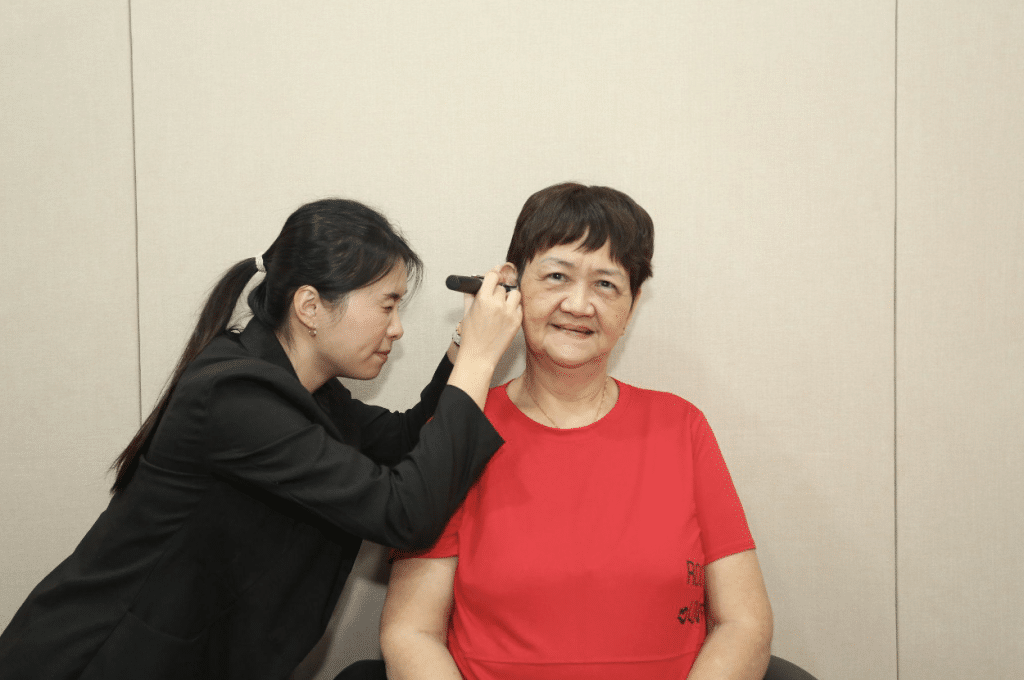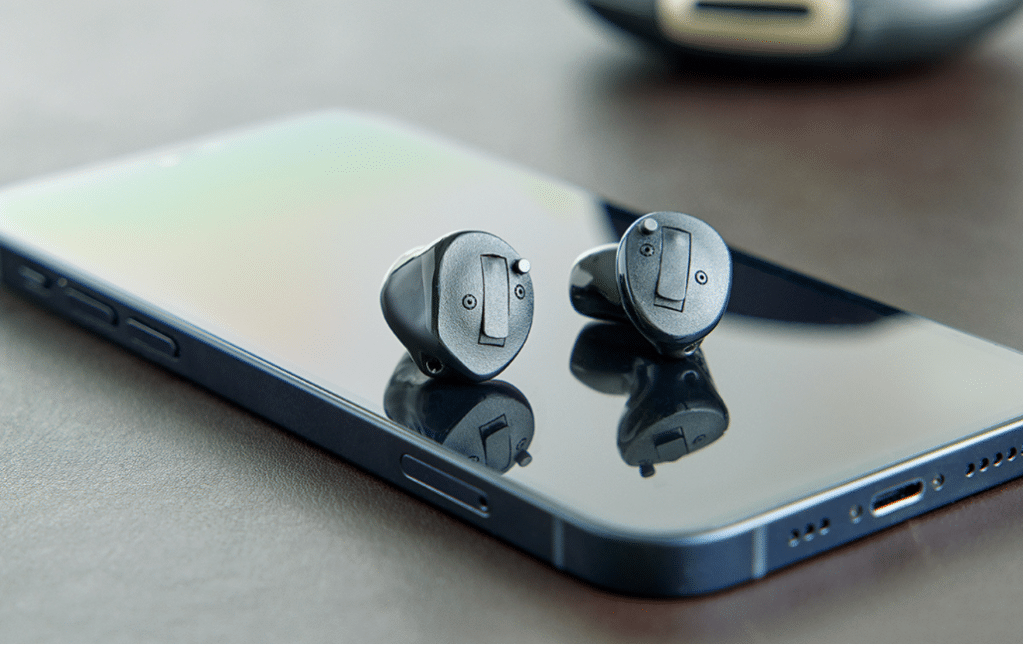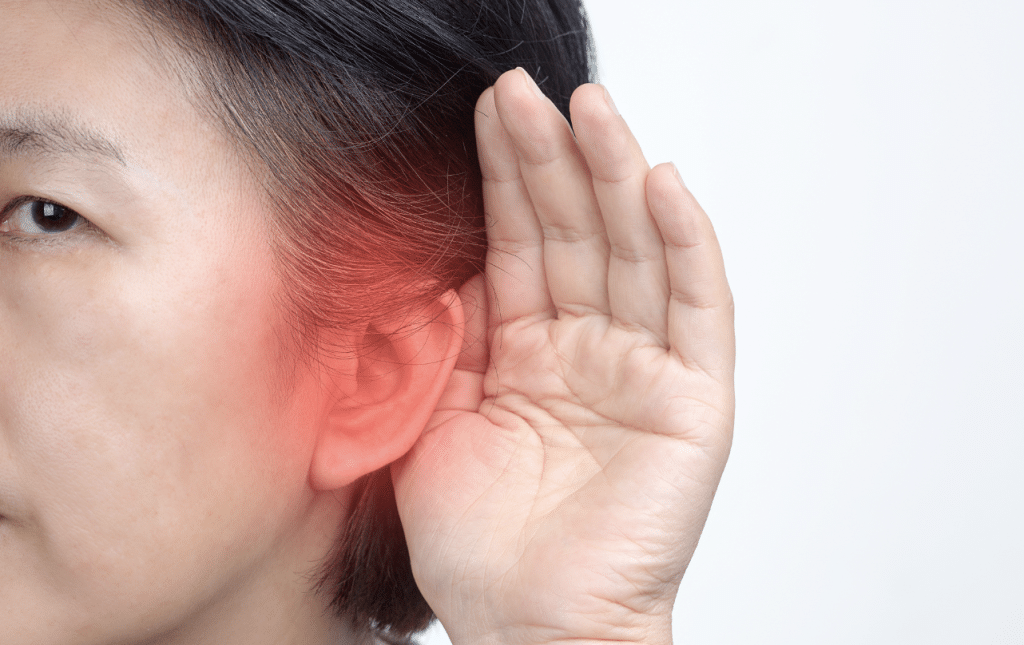Article by Hearing Partners, contributed by Jennifer Lee, Senior Clinical Audiologist at Hearing Partners
Sensorineural hearing loss occurs when there is damage to the inner ear or the nerves that transmit signals from the ear to the brain. This type of hearing loss is often permanent and can result in sounds being perceived as distorted, even at high volumes.
This article will discuss the symptoms and causes of sensorineural hearing loss, followed by an exploration of the diagnostic methods used. Additionally, we will provide detailed information on the available treatment options for sensorineural hearing loss, as well as highlight the distinctions between sensorineural and conductive hearing loss.
Symptoms of Sensorineural Hearing Loss
Sensorineural hearing loss can impact either one or both ears, and can be gradual or sudden. These are some common symptoms associated with this form of hearing loss:
- Distorted hearing
- Reduced speech understanding, even when speech is loud and/or especially in a noisy environment
- Decreased ability to hear soft sounds
- Tinnitus (ringing in the ears)
- Dizziness
Causes of Sensorineural Hearing Loss
Sensorineural hearing loss can be attributed to various factors including aging, exposure to loud noises, genetic factors and medications.
Aging

The primary factor contributing to hearing loss is the process of aging. Sensorineural hearing loss, in particular, typically manifests around the age of 60 (aging starts at 40 but usually people notice the hearing loss at 60 due to its severity). A common indication of this condition is difficulty comprehending speech amidst background noise and requiring repetitions to understand.
Noise Exposure
Prolonged exposure to loud noises can cause damage to the inner ear, resulting in sensorineural hearing loss. This can happen in various settings, including workplaces like metalworking, construction, and manufacturing industries. Leisure activities such as attending concerts, going to nightclubs, and listening to excessively loud volumes on your headphones can also contribute to sensorineural hearing loss.
The maximum sound intensity that is safe to listen to for extended periods is 75dBSPL, equivalent to the sound level of an average vacuum cleaner or hairdryer. On media devices, that is approximately 70% of the volume bar. When listening to higher levels, reduce the listening duration or limit it to 1 hour a day to avoid damaging the ears.
Genetics
Newborns can experience sensorineural hearing loss due to complications during birth, or staying in the NICU for prolonged periods. Mothers can also transmit infections like syphilis, toxoplasmosis, CMV, rubella, and herpes to their babies in the womb, leading to hearing loss.
Physical Trauma
An injury to the head can cause damage to the ears and nerves. Subsequently, this can result in temporary or permanent sensorineural hearing loss.
Illnesses or infections
Illnesses such as Meniere’s disease and infections affecting the inner ear such as meningitis, measles and mumps can potentially cause sensorineural hearing loss.
Tumors
A tumor on the vestibulocochlear nerve, also known as acoustic neuroma, can affect the function of the auditory nerve, causing tinnitus, dizziness and/or sensorineural hearing loss.
Ototoxic Drugs and Cancer Treatments
Certain medications have the potential to harm the nerves responsible for hearing or the sensory cells located in the cochlea. Prescribing doctors should inform users of the potential risk of hearing loss and monitor the duration of drug use and hearing levels of the patient closely. Examples of such drugs include:
- Antibiotics including aminoglycosides
- Diuretics including frusemide
- Antineoplastics
Treatment used for cancer, such as chemotherapy and radiotherapy, can also cause damage to the hearing organ and nerve due to the nature of the treatment.
Diagnosing Sensorineural Hearing Loss

To accurately diagnose and treat sensorineural hearing loss, it’s best to schedule a comprehensive hearing evaluation with an audiologist. The audiologist will examine your ear to check for any signs of inflammation, fluid accumulation, earwax buildup or damage to the eardrum. They’ll also check for the presence of foreign objects.
Next, the audiologist will carry out a hearing test in a soundproof booth. Different tones and words will be played at various volumes and frequencies in each ear. The purpose of this test is to determine the softest sound you can hear and identify specific frequencies where hearing loss may be present.
Treatment for Sensorineural Hearing Loss
Prevention is better than cure. Adopt healthy hearing habits and diet to slow down hearing deterioration and monitor your hearing regularly for early detection and intervention. Hearing loss can potentially result in social isolation and reduced quality of life if left untreated.
For cases of sudden sensorineural hearing loss, see a medical doctor as soon as possible, ideally within the first 2 weeks of onset. Your ENT doctor may recommend medication such as steroid pills or steroid injections and a series of hearing tests to monitor the effects of steroids. However, medical and surgical interventions can rarely restore this type of hearing loss fully. In that case, the use of hearing aids and cochlear implants will be a better option to manage the residual hearing loss.
Hearing Aids

Medical-grade hearing aids are designed to help individuals manage the symptoms of hearing loss by customising the sound amplification to the users’ hearing configuration.
For instance, if you encounter difficulties hearing high-frequency sounds, a hearing aid can effectively amplify these specific sounds while leaving other frequencies unaffected.
As technology advances, hearing aids have and are still improving their listening support features like noise suppression while retaining environmental cues and speech clarity to balance user comfort and benefit.
Cochlear Implants
A cochlear implant is a device used to assist individuals with severe to profound sensorineural hearing loss who are unable to benefit from hearing aids. It’s made up of 2 components, an external processor which is worn behind the ear, and a receiver which is surgically implanted under the skin.
The external processor captures sounds from the environment and transmits them to the internal receiver. The receiver then sends electrical signals to the auditory nerve, enabling the user to comprehend the initial sounds detected by the processor.
Sensorineural vs Conductive Hearing Loss
The 2 main types of hearing loss are sensorineural and conductive hearing loss.
| Sensorineural hearing loss | Conductive hearing loss | |
| Part of the ear that is affected | Inner ear or cochlear and/or its associated nerves | Middle or outer ear |
| Causes | Aging Genetics Illnesses (e.g. meningitis, measles, mumps and Meniere’s disease) Nerve tumors or growths Ototoxic drugs and medications Prolonged exposure to loud noises | Middle ear: Benign growth in the middle ear Damage to the sound-conducting bones Middle ear infection Perforated eardrum Outer ear: Birth deformities Bony growths in the ear canal (i.e. surfer’s ear) Ear canal infection (i.e. swimmer’s ear)Ear wax buildup Foreign objects in the ear canal |
| Impact | Voices sound unclear or distortedDecrease in the perceived loudness of a sound | Decrease in the perceived loudness of a sound |
| Management | Hearing aidsCochlear implants | Surgery Other forms of medical management Hearing aids or bone-anchored hearing systems |
Keeping Sensorineural Hearing Loss at Bay
Many individuals experience sensorineural hearing loss as they age, which is a normal occurrence. Nevertheless, hearing loss at any age should be managed as soon as possible so that quality of life is not affected and implications of hearing loss, such as dementia and depression, can be kept at bay.
It’s also important to remember that exposure to loud noises can result in permanent damage to your inner ear or auditory nerve. By adopting these healthy hearing habits, you can prevent any harm to your ears caused by excessive noise.
- Keep your headphone volume below 70% of the maximum volume
- Wear earplugs in places with loud sounds
- Take regular hearing tests
- Consult a doctor before taking any new medication
